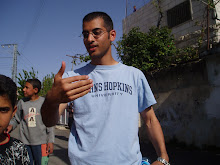 July 3
July 3Left: Red Crescent ambulances at the PRC office in Hebron.
Today I went to al-Ahli to say goodbye to the doctors and nurses in the ER, and to Abd al-Salam, the hospital administrator I’d spoken to when I was in San Antonio. Musa was in Abd al-Salam’s office when I showed up; he was getting a report about a young man named Yousef ‘Ashur (20 years old) who was being transferred from al-Ahli in Hebron to al-Mukassed Hospital in Jerusalem last night (a distance of about 20 miles). The ambulance was stopped at the tunnel checkpoint between Bethlehem and Jerusalem; the tunnel connects the two cities so Jews can travel between them without having to see the Palestinian town of Beit Jala.
Al-Mukassed is a tertiary care facility with about 300 beds (I think) in East Jerusalem. It’s by far the most advanced hospital in the West Bank, mostly owing to its location. ‘Ashur had some kind of severe pulmonary edema or hemothorax (or maybe both) requiring treatment he couldn’t get at al-Ahli, so they decided to take him to al-Mukassed.
The soldiers at the tunnel checkpoint stopped the ambulance and told the driver they couldn’t go through (it’s called “general closure”: the West Bank becomes a prison until the IDF says otherwise). In such circumstances the Palestinian health care system has worked out a way around the closure: two ambulances approach the checkpoint from the two different sides, the patient is taken out of the first ambulance and carried over to the second, and then put into the second ambulance to be taken wherever he/she needs to go. At the tunnel checkpoint this isn’t a big deal (aside from the miserable humiliation), but when there are huge ditches, mounds of earth or concrete blocks between the two sides of the checkpoint (as is quite common) it can be dangerous to carry terminally ill people over the roadblocks.
The ambulance driver told Musa what happened when they got to the checkpoint:
We arrived at the checkpoint after coordination between the Red Crescent [in Hebron] and the Red Cross [in Jerusalem]. The Red Cross was supposed to arrange the crossing of the ambulance to the Israeli side [meaning through the checkpoint]. When we arrived at the tunnels checkpoint, a border policeman with dark skin stopped us. He yelled at me in Hebrew to go back to where I came from. I told him in Hebrew that I was driving a patient in critical condition and that in a humanitarian condition such as this he had to let me pass. The policeman told me that I was not allowed to go through the checkpoint to Jerusalem . I told him that only a few days earlier, after coordination with the Red Cross, I had passed through this checkpoint to Jerusalem . The policeman wasn't convinced and insisted that I leave the place.
I didn't leave. I parked the ambulance on the right side of the road, about seventy meters from the checkpoint. Taher [the other ambulance driver] and I called the Red Crescent in Hebron and Bethlehem and asked them to coordinate between the Red Cross and the Israeli side so we could pass. The Red Crescent official in Bethlehem promised to take care of it and told us to wait next to the checkpoint.
About three quarters of an hour later, around 3:00 P.M., a border policeman, who appeared to be Druze [a religious minority in Israel that serves in the army and has a reputation for particularly sadistic cruelty], approached us and asked about the patient's condition. He opened the ambulance door and looked at the patient lying inside with a tube for draining fluids attached to his chest. It was obvious from the appearance of the patient that he was in a very critical condition. The policeman was not convinced and said that a Palestinian ambulance was allowed to cross an Israeli checkpoint only if the patient was in a life-threatening condition. I emphasized to him that the patient was in a life-threatening condition, but he said “No, he can wait.” I asked him if he was a doctor. He didn't reply and went back to the checkpoint.
Around 3:45 P.M., while we were waiting for an answer from the Red Crescent in Bethlehem, a third policeman came and asked us to move away from the checkpoint. The policeman was nervous. We moved back about 200 meters and stopped next to the entrance of the road that led to Beit Jala. We continued to wait for the Red Crescent's reply. Around 4:00 P.M., the Red Crescent notified us that there was no point in continuing to wait, and that we should return the patient to al-Ahli hospital in Hebron. They promised they would continue to try to coordinate the transport of the patient for tomorrow. We returned the patient to al-Ahli hospital. He was exhausted from the long wait at the checkpoint.
The next morning, a Red Crescent ambulance took the patient to the tunnels checkpoint where a Jerusalem Red Crescent ambulance was waiting and took the patient to al-Makassed Hospital.
